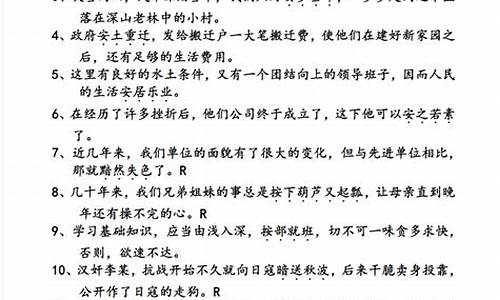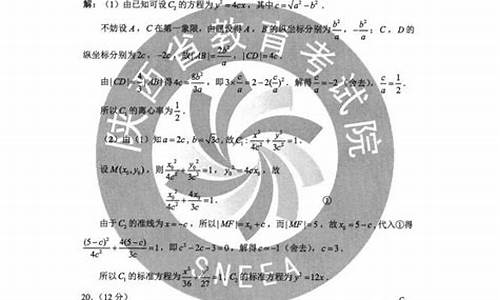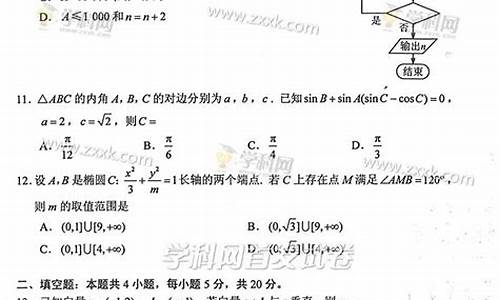2017年高考英语广西-2017年广西高考英语作文范文
1.广东20|7年高考英语科目是否取消
2.新东方李辉老师他的课程怎么样,值不值得买他的直播。
3.2017高考英语词汇详解:take短语的用法归纳
4.为什么高考的时候要把英语科目放在最后?
5.2017高考英语动词不定式专项知识点
广东20|7年高考英语科目是否取消

1、教育部高考改革的总体方向是最早2017年高考起,文理不分科,英语科目不再进行统考,而在平时进行考试,一年两考或多考,取成绩最好的一次提供给高校作为录取的参考依据。
2、目前就读高中的学生仍然会分文理,会考英语,有少量省份可能会进行改革的试点,会进行高考科目的分值调整,英语科目可能会调整到100-120分(北京市2016年高考英语科目为100分)。但大部分省份不会调整,要等教育部总体改革方案出台后一并出台改革措施。
新东方李辉老师他的课程怎么样,值不值得买他的直播。
李辉老师的课程当然值得买了,但是李辉老师现在不在新东方了,在有道精品课。确切地说,有道精品课李辉老师的课程值得买。
哈哈哈我说说我的亲身经历吧!
首先表明身份,我是19年河南考生,高考英语120分。先晾一下我高考的分数截图吧哈哈哈
我是在高二的一个机缘巧合下,通过有道精品课认识了李辉老师,当时我只尝试着听了一节公开课“英语语法的秘密”,但就是这一节公开课,我在一次期末考试中一下从之前的60分考到了80分,简直提了20分。
哈哈哈当时真是开心的不行。一个公开课居然有这么大的能量,简直不可想象。
于是,我就报了辉哥的全程班,跟着辉哥学了高考英语完整的体系。在辉哥的教导下,我听话照做,活在当下,以120分拿下了高考英语,相对于之前60分的我,我一下提了60分,这可以说是逆天改命了吧!再让大家看一下我高中的提分截图吧
我觉得一个老师能够让一个学生在短时间内快速提分,这个老师一定具有很强的教学能力和扎实的功底。而李辉老师就是这样的一名老师,让我差不多一年的时间提了60分,而且不仅是我,还有很多的高考学子跟着辉哥也快速提分了。
我经历过,我亲身学习过,我也从中获得过,依据自己的亲身经历,我认为李辉老师的课绝对值得你去学习。
什么最能够证明一个老师的强大?一方面是老师的实力,一方面是老师让学生快速提分的学生数量。而这些方面李辉老师都具备,所以放心听辉哥的课吧!只要你好好学,提分不是梦。
哈哈哈其实你也可以去有道精品课免费试听辉哥的公开课,自己亲自感受一下,你就什么都知道了!
哈哈哈买到就是赚到(大家一定要先体验后,再根据自身的需要去选择购买课程,千万别盲目跟风,要跟从实际和自己的内心)
2017高考英语词汇详解:take短语的用法归纳
高考英语词汇详解:take短语的用法归纳
1 . take back 收回,接回,退回。如:
I’m sorry, I take back what I said. 对不起,我收回我说过的话。
They wouldn’t take back the shirt. 衬衫他们不让退货。
2 . take down
写下,记下。如:
He took down everything the teacher said. 他把老师说的所有话都记了下来。
I didn’t take down his phone number. 我没有记下他的电话号码。
拆下,拆掉。如:
The machine takes down easily. 这机器很容易拆。
They decided to take down the dangerous bridge. 他们决定把这座危险的桥拆掉。
3 . take in
收留。如:
So he took in the boy . 所以他就收留了这个男孩。
包括。如:
The list takes in everyone. 每个人都上了名单。
理解。如:
We find it difficult to take in what he teaches. 我们发现他教的东西很难理解。
欺骗,使上当。如:
Don’t be taken in by his promises. 别被他的诺言所欺骗。
4 . take off
脱下。如:
Take off your wet clothes. 脱下你的湿衣服。
He took off his glasses and looked up. 他取下眼镜, 抬头看了看。
起飞。如:
When did the plane take off? 飞机是什么时候起飞的?
打折扣,扣掉,去掉。如:
Can you take five dollars off the price? 你可以减价五美元吗?
请假,休息。如:
I want to take a day off . 我想休假一天。
5 . take on
聘用,雇用。如:
The company decided to take on a new secretary. 这家公司决定聘一个新秘书。
呈现,显现,具有。如:
This word had taken a new meaning. 这个词有了新的意义。
Her face took on a new expression. 她的脸上露出了新的表情。
承担或担任。如:
He advised me not to take too much work. 他劝我不要做太多的工作。
为什么高考的时候要把英语科目放在最后?
文/观察者网庄怡明天,就是全国高三党们上“战场”的大日子,十二年寒窗苦读磨一剑,一场可以预见的“血雨腥风”正在到来!
今年各省市考试科目都有哪些变化呢?下面为大家一一道来~
广东
前三科都是送分题,最后一科难度稍大,对考生的动作敏捷度、以及吃货心理是否强大有较大考验。
福建
与广东省相爱相杀,最后一道是送命题,高低分不出意外会成对出现。
有往届考生就流下了一把辛酸泪~
东北
保护动物人人有责,所以本届貂的穿搭科目将全部使用人造皮毛。
其中黑龙江省自命题,徒手搏虎女生稍有劣势,不过可以携带刀、棒等器械。
内蒙古
与往年一样,今年考试内容没有太大变化,而且在第二科烤全羊技巧考试结束后,还能亲自品尝成果,算是对高中三年的美好纪念。
山东
摊煎饼和种大葱是传统科目,大部分考生都能熟练应对,不做赘述。
不过,有部分网友觉得没有挖掘机的高考是不完整的,所以强烈建议明年新增这一科。
云南
相比广东福建相爱相杀,云南更加是对自我的考验,特别是吃蘑菇和吃虫这两科。
来自过来人的提醒,吃蘑菇要特别当心!
新疆
烤羊肉串和烹饪大盘鸡时要注意掌握火候,不然烤焦了还得自己吃下去。
广西
广西今年考试科目相对其他省来说要轻松的多,吃吃吃就足够了。
有朋友已经看到了顺利出线的希望,985211不是梦~
不过,由于3科考试都是吃粉,所以对胃口小的考生来说是极为不利的,建议带上一些健胃消食片。
贵州
有考生分享了自己的经验,大家可以作为参考……
浙江
温州卷和义乌卷各有特色,其中温州卷只是设,千万不要当真!
江苏
持续内斗中……
四川
出题组你出来,熊猫自带是认真的么!
对了友情提醒,川普在成绩出来3天后才考,别忘了……
好啦,以上纯粹玩笑,正儿八经的高考可不是打两句嘴炮就能应付得了的!
人生能有几回搏,此时不搏待何时。祝福所有高考考生!
2017高考英语动词不定式专项知识点
1 不定式作宾语
1) 动词+ 不定式
afford, aim, appear, agree, arrange, ask, be, decide, bother, care, choose, come, dare, demand, desire, determine, expect, elect, endeavor, hope, fail, happen, help, hesitate, learn, long, mean, manage, offer, ought, plan, prepare, pretend, promise, refuse, seem, tend, wait, wish, undertake
The driver failed to see the other car in time. 司机没能及时看见另一辆车。
I happen to know the answer to your question. 我碰巧知道你那道问题的答案。
2) 动词+不定式;动词+宾语+不定式
ask, beg, choose, expect, hate, help intend like, love, need prefer, prepare, promise, want, wish
I like to keep everything tidy. 我喜欢每件东西都保持整洁。
I like you to keep everything tidy. 我喜欢你使每件东西都保持整洁。
I want to speak to Tom. 我想和汤姆谈话。
I want you to speak to Tom. 我想让你和汤姆谈话。
3) 动词+疑问词+ to
decide, know, consider forget, learn, remember, show, understand, see, wonder, hear, find out, explain, tell
Please show us how to do that. 请演示给我们如何去做。
There are so many kinds of tape-recorders on sale that I can't make up my mind which to buy.有这么多的录音机,我都拿不定主意买哪一种。
注意
疑问词带不定式在句中作成分时,谓语动词用单数。如:The question is how to put it into practice. 问题是怎样把它付诸实施。
2. 不定式作补语
1) 动词+宾语+不定式(to do)
advise, allow, appoint, believe, cause, challenge, command, compel, consider, declare, drive, enable, encourage, find, forbid, force, guess, hire, imagine, impel, induce, inform, instruct, invite, judge, know, like, order, permit, persuade, remind, report, request, require, select, send, state, suppose, tell, think, train, trust, understand, urge, warn
a.Father will not allow us to play on the street. 父亲不让我们在街上玩耍。
b.We believe him to be guilty. 我们相信他是有罪的。
Find 的特殊用法
Find 后可用分词做宾补,或先加形式宾语,再加形容词,最后加带to 的动词不定式。find后也可带一个从句。此类动词还有get,have。
I found him lying on the ground.
I found it important to learn.
I found that to learn English is important.
典型例题
The next morning she found the man ___ in bed,dead.
A. lying B. lie C. lay D. laying
答案:A.find的宾语后面,用分词或分词短语,起宾语补足语作用。现在分词表达主动,也表达正在进行,过去分词表达被动。
2) to + be 的不定式结构,作补语的动词。
acknowledge, believe, consider, think, declare(声称), discover, fancy(设想), feel, find, guess, judge, imagine, know, prove, see(理解), show, suppose, take(以为), understand
We consider Tom to be one of the best students in our class. 我们认为汤姆是班上的学生之一。
典型例题
Charles Babbage is generally considered ___ the first computer.
A. to invent B. inventing C. to have invented D. having invented
答案:A. 由consider to do sth. 排除B、D。. 此句只说明发明这一个事实,不定式后用原形即可。而C为现在完成时,发明为点动词一般不用完成时,且此处也不强调对现在的影响,因此不选C。
3) to be +形容词
seem, appear, be said, be supposed, be believed, be thought, be known, be reported, hope, wish, desire, want, plan, expect, mean
The book is believed to be uninteresting. 人们认为这本书没什么意思。
4) there be+不定式
believe, expect, intend, like, love, mean, prefer, want, wish, undrstand
We didn't expect there to be so many people there. 我们没料到会有那么多人在哪里。 注意
有些动词需用as 短语做补语,如regard, think believe, take, consider.
We regard Tom as our best teacher. 我们认为汤姆是我们的老师。
Mary took him as her father . 玛丽把他当作自己的父亲。
3. 不定式作主语
1) It's easy (for me) to do that. 我做这事太容易了。
easy, difficult, hard, important, possible, impossible, comfortable, necessary, better; the first, the next, the last, the best, too much, too little, not enough
It's so nice to hear your voice. 听到你的声音真高兴。
It's necessary for you to lock the car when you do not use it. 当你不用车的时候,锁车是有必要的。
2) It's very kind of you to help us. 他帮助我们,他真好。
kind, nice, stupid, rude, clever, foolish, thoughtful, thoughtless, brave, considerate(考虑周到的), silly, selfish(自私的)
It was silly of us to believe him. 我们真愚蠢,竟然相信了他。
It seemed selfish of him not to give them anything. 他不给他们任何东西,这显得太自私了。 注意
1) 其他系动词如,look,appear等也可用于此句型
2) 不定式作为句子成分时,动词用单数形式。
3) 当不定式作主语的句子中又有一个不定式作表语时,不能用It is? to?的句型
(对)To see is to believe. 百闻不如一见。(错)It is to believe to see.
It's for sb.和 It's of sb.
1) for sb. 常用于表示事物的特征特点,表示客观形式的形容词,如easy, hard, difficult, interesting, impossible等:
It's very hard for him to study two languages. 对他来说学两门外语是很难的。
2) of sb的句型一般用表示人物的性格,品德,表示主观感情或态度的形容词,如good, kind, nice, clever, foolish, right。
It's very nice of you to help me. 你来帮助我,你真是太好了。
for 与of 的辨别方法
用介词后面的代词作主语,用介词前边的形容词作表语,造个句子。如果道理上通顺用of,不通则用for。如:You are nice. (通顺,所以应用of)。He is hard. (人是困难的,不通,因此应用for。)
4. 不定式作表语
不定式可放在be动词后面,形成表语。例如:
My work is to clean the room every day.
His dream is to be a doctor.
5. 不定式作定语
不定式做定语通常要放在被修饰的词后。例如:
I have a lot of work to do.
So he made some candles to give light.
6. 不定式作状语
1) 目的状语
To? only to (仅仅为了), in order to, so as to, so(such)? as to? (如此?以便?) He ran so fast as to catch the first bus. 他飞快地跑以便赶上第一班车。
I come here only to say good-bye to you. 我来仅仅是向你告别。
2) 作结果状语,表事先没有预料到的,要放在句子后面。
What have I said to make you angry.
He searched the room only to find nothing.
3) 表原因
I'm glad to see you.
典型例题
The chair looks rather hard, but in fact it is very comfortable to ___.
A. sit B. sit on C. be seat D. be sat on
答案:B. 如果不定式为不及物动词,其后应有必要的介词。当动词与介词连用时,常位于"形容词+动词不定式"结构的末尾。
用作介词的to
to 有两种用法:一为不定式+动词原形; 一为介词+名词/动名词, to 在下面的用法中是第二种,即to+ 名词/动名词:admit to承认,confess to承认,be accustomed to 习惯于,be used to 习惯于,stick to 坚持,turn to开始,着手于,devote oneself to 献身于,be devoted to 致力于, look forward to 盼望,pay attention to
注意
省to 的动词不定式
1) 情态动词 ( 除ought 外,ought to):
2) 使役动词 let, have, make:
3) 感官动词 see, watch, look at, notice , observe, hear, listen to, smell, feel, find 等后作宾补,省略to。
注意
在被动语态中则to 不能省掉。
I saw him dance. =He was seen to dance.
The boss made them work the whole night.=They were made to work the whole night.
4) would rather,had better:
5) Why? / why not?:
6) help 可带to,也可不带to, help sb (to) do sth:
7) but和except:but前是动词do时,后面出现的动词用不带to的动词不定式。
8) 由and, or和than连接的两个不定式,第二个to 可以省去:
9) 通常在discover, imagine, suppose, think, understand等词后,可以省去to be:He is supposed (to be) nice. 他应该是个好人。举例:He wants to move to France and marry the girl. He wants to do nothing but go out. 比较:He wants to do nothing but go out. He wants to believe anything but to take the medicine.
典型例题
1) ---- I usually go there by train.
---- Why not ___ by boat for a change?
A. to try going B. trying to go C. to try and go D. try going
答案:D. why not 后面接不带to 的不定式,因此选D。
2) Paul doesn't have to be made ___. He always works hard.
A. learn B. to learn C. learned D. learning
答案:B. make后接不带to 的动词不定式,当其用于被动时,to 不可省略。
动词不定式的否定式
Tell him not to shut the window?
She pretended not to see me when I passed by. 我走过的时候,她假装没看见。
典型例题
1) Tell him ___ the window.
A. to shut not B. not to shut C. to not shut D. not shut
答案:B。 tell sb to do sth 的否定形式为tell sb not to do sth.
2) She pretended ___ me when I passed by.
A. not to see B. not seeing C. to not see D. having not seen
答案:A。 pretend 后应接不定式。其否定形式为pretend not to do sth.。
3) Mrs. Smith warned her daughter ___ after drinking.
A. never to drive B. to never driver C. never driving D. never drive
答案:A。warn sb to do sth. 的否定形式为warn sb not to do sth. 此处用的是否定词never.
4) The boy wanted to ride his bicycle in the street,but his mother told him ____.
A. not to B. not to do C. not do it D. do not to
答案:A。not to 为not to do it 的省略形式。可以只用to这个词,而不必重复整个不定式词组。及物动词do后应有名词、代词等,否则不对,因此B,D不对。
5) The patient was warned ___ oily food after the operation.
A. to eat no B. eating not C. not to eat D. not eating
答案:C。warn一词要求后用不定式,此处为不定式的被动,否定形式为be warned not to do。 不定式的特殊句型too?to?
1) too?to 太?以至于?
He is too excited to speak. 他太激动了,说不出话来。
---- Can I help you ? 需要我帮忙吗?
---- Well, I'm afraid the box is too heavy for you to carry it, but thank you all the same. 不用了。这箱子太重,恐怕你搬不动。谢谢您。
2) 如在too前有否定词,则整个句子用否定词表达肯定, too 后那个词表达一种委婉含义,意 为"不太"。
It's never too late to mend. (谚语) 改过不嫌晚。
3) 当too 前面有only, all, but时,意思是:非常? 等于very。
I'm only too pleased to be able to help you. 我非常高兴能帮助你。
He was but too eager to get home. 他非常想回家。
不定式的特殊句型so as to
1) 表示目的;它的否定式是so as not to do。
Tom kept quiet about the accident so as not to lose his job. 汤姆对事故保持沉默是为了不丢掉他的工作。
Go in quietly so as not to wake the baby. 轻点进去,别惊醒了婴儿。
2) so kind as to ---劳驾
Would you be so kind as to tell me the time? 劳驾,现在几点了。
不定式的特殊句型Why not
"Why not +动词原形"表达向某人提出建议,翻译为:"为什么不" "干吗不"
例如:Why not take a holiday? 干吗不去度假?
声明:本站所有文章资源内容,如无特殊说明或标注,均为采集网络资源。如若本站内容侵犯了原著者的合法权益,可联系本站删除。












